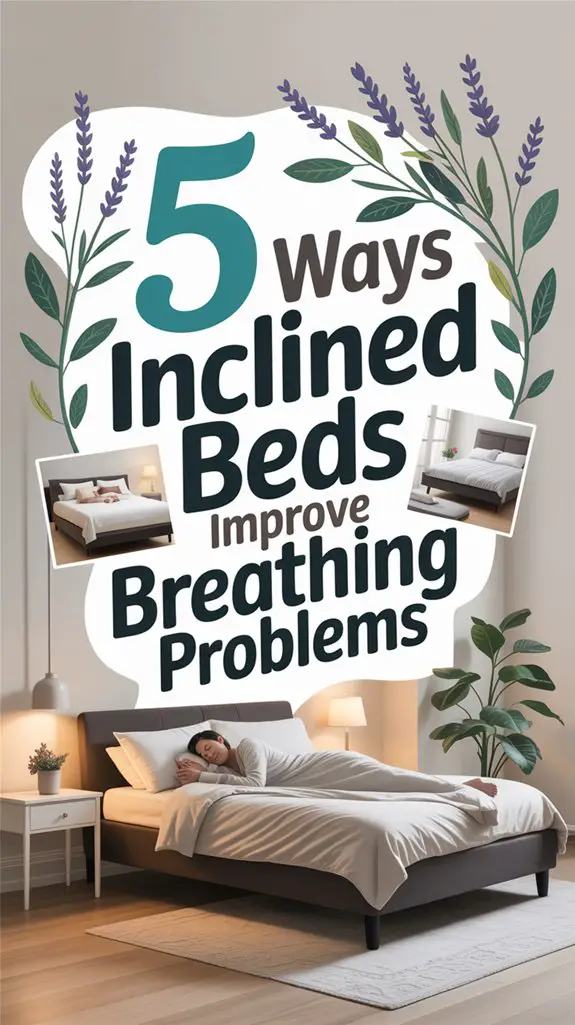Inclined beds? Let me tell you, they’ve totally transformed my experience with breathing issues.
Remember those sleepless nights, tossing and turning, trying to catch my breath? Ugh! My trusty inclined bed has been a game-changer.
It’s wild how it keeps my airways open. I’ve noticed way less snoring and—thank goodness—no more waking up gasping for air!
Not to mention, my lungs feel more alive; it’s like a breath of fresh air! Seriously, who doesn’t want to feel that way?
At Corala Blanket, we’re all about promoting better sleep, and I can say with confidence that these beds really work wonders.
Have you tried one yet? If not, you might be missing out on some serious zzz’s!
Table of Contents
Quick Takeaways
- Elevating the head of the bed promotes airway patency, preventing obstructions from the tongue and soft palate.
- Inclined sleeping enhances lung function, improving oxygen levels and overall respiratory efficiency.
- Sleeping at an incline reduces post-nasal drip and mitigates nighttime coughs for better breathing.
- Propping up helps boost blood circulation and lowers blood pressure, benefiting cardiovascular health.
- Inclined positions support brain detoxification, enhancing cognitive function and overall well-being during sleep.
Enhancing Airway Patency to Prevent Snoring and OSA
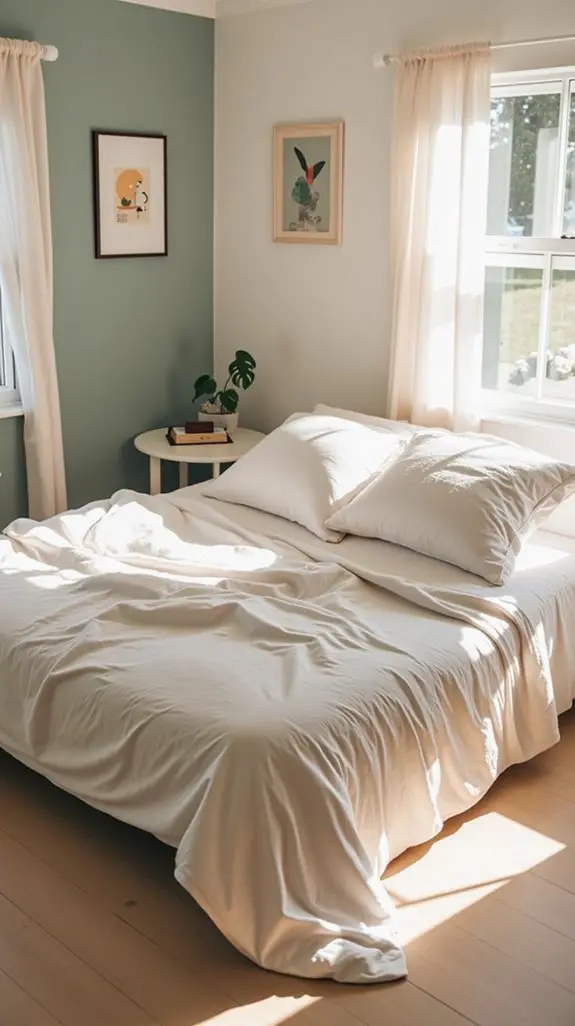
When it comes to getting a good night’s sleep, snoring and obstructive sleep apnea (OSA) can really rain on our parade, right?
Here’s a powerful tip: elevating the head of your bed can greatly reduce snoring. Studies show even a slight incline—just 12 degrees—can boost snoring reduction by 7%! A study showed that using an inclined bed led to a significant improvement in overall sleep quality. This is due to how inclined bed therapy can enhance circulation, making it even easier to breathe at night.
Elevating your bed’s head can be a simple yet effective solution to reduce snoring significantly.
By keeping your airway open, you prevent those pesky airway obstructions caused by the tongue and soft palate. This move not only enhances breathability but also supports nasal breathing, giving you a more restful night.
Improving Lung Function and Oxygen Saturation Levels
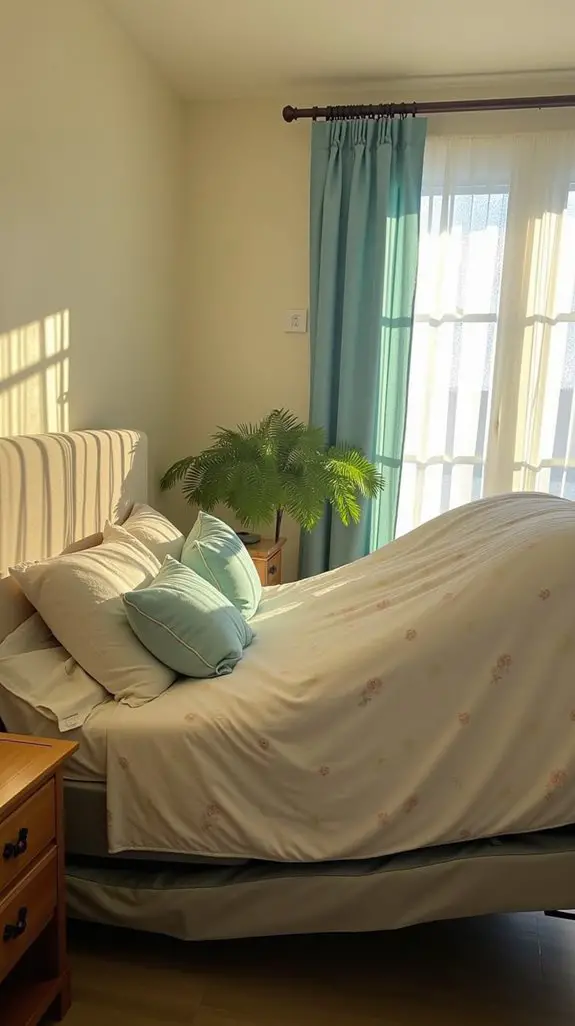
Elevating the head of your bed isn’t just a trick; it’s a game-changer for lung function and oxygen saturation!
By simply adjusting your sleep position, you’re expanding breathing and optimizing airflow like a pro.
Here’s how it works:
- Better Lung Volume: A slant helps your diaphragm work more efficiently, boosting lung capacity.
- Enhanced Oxygen Levels: Sleeping inclined improves oxygen saturation, especially for those with respiratory conditions; studies show that at angles between 30-45 degrees, there can be significant improvements in lung function. This elevation also facilitates better brain fluid flow, which is crucial for overall health.
- Improved Compliance: Elevation makes your lungs more compliant, fighting off respiratory acidosis.
Reducing Post-Nasal Drip and Coughing During Sleep
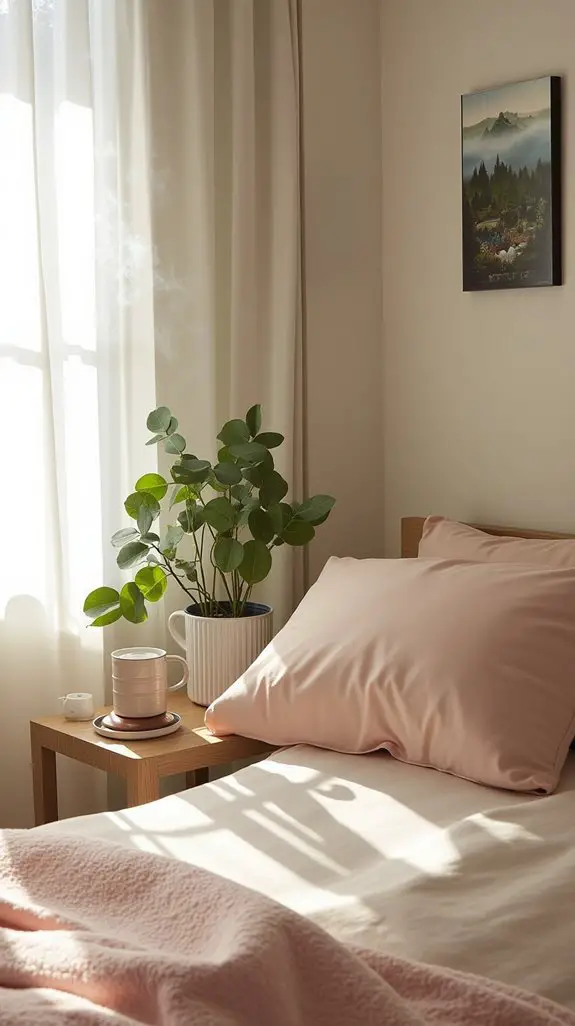
Sleep can be a battlefield, especially when it comes to post-nasal drip and annoying coughing fits.
I’ve found that sleep elevation is a game-changer for mucus management! By propping my head up at a gentle incline, I’m able to stop mucus from pooling down my throat. Inclined sleeping works wonders here, draining that pesky mucus and reducing nighttime coughs. Studies show that inclined sleeping positions can significantly enhance recovery and breathing efficiency for individuals with breathing issues.
Can you envision waking up refreshed instead of drained?
Plus, this position limits throat irritation, giving my airways a fighting chance!
Supporting Better Blood Circulation and Respiratory Efficiency
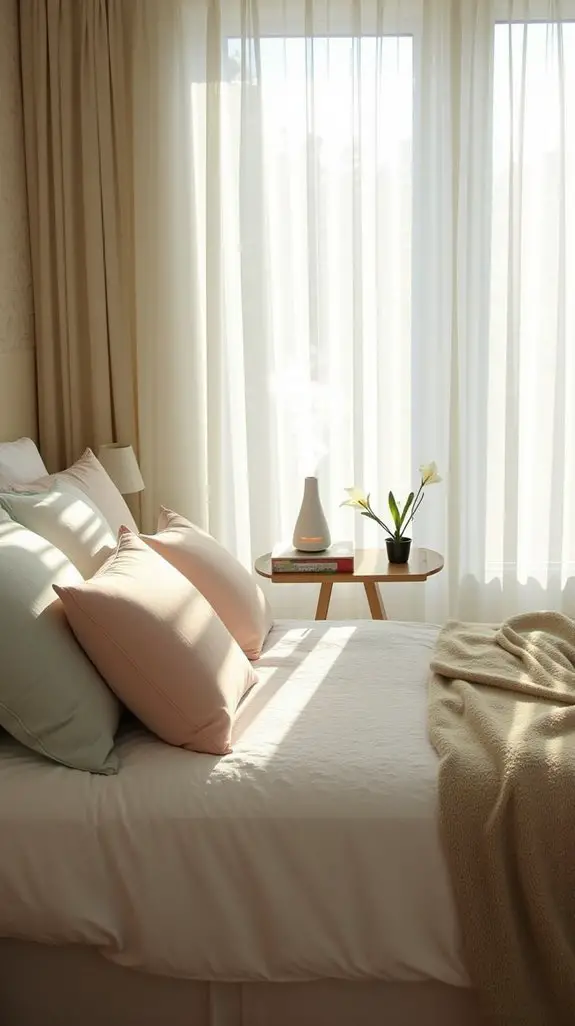
While it might seem like a simple tweak, propping yourself up at an incline can be a total game-changer for both blood circulation and breathing efficiency. Who knew sleeping could feel so powerful?
Just think about it:
- It enhances blood flow, making your heart health soar.
- It lowers blood pressure, easing the strain on your cardiovascular system.
- It helps keep symptoms of sleep apnea at bay, allowing you to breathe smoother.
- It can significantly reduce snoring and sleep apnea, allowing for a more restful night.
With these benefits, you’re not just sleeping; you’re investing in your health.
Facilitating Brain Detoxification and Lowering Intracranial Pressure
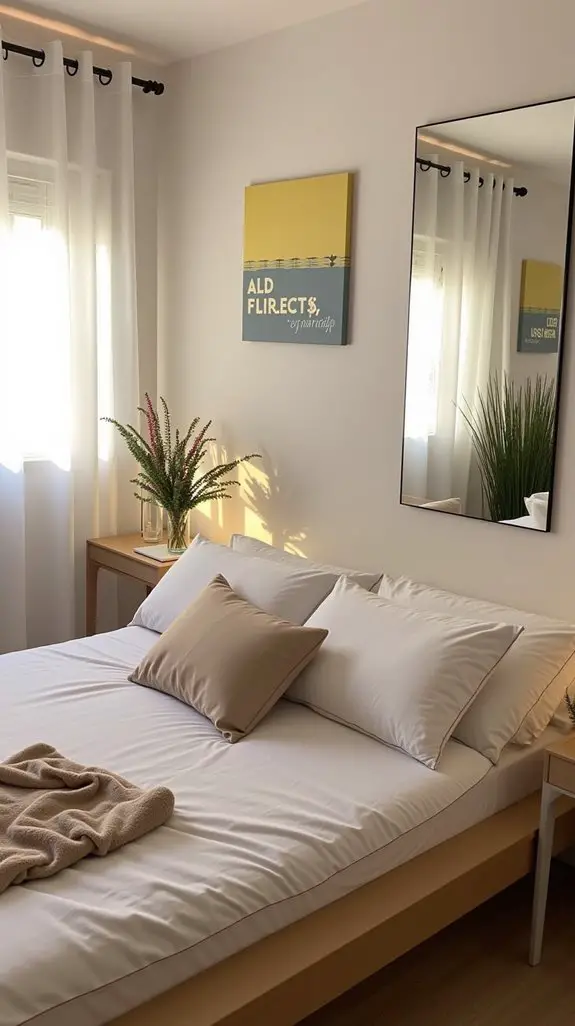
Staying at an incline while you snooze does more than boost your heart health and help you breathe better—it also plays a major role in keeping your brain in tip-top shape.
With inclined sleeping, you enhance glymphatic efficiency, allowing your brain to detoxify better during deep sleep. By using gravity to help with waste removal, you’re actually managing intracranial pressure!
Inclined sleeping boosts glymphatic efficiency, enhancing brain detox during deep sleep and helping manage intracranial pressure effectively!
Plus, don’t underestimate hydration importance. Keeping those fluids flowing supports your brain’s “rinse cycle.” Additionally, enhanced lymphatic drainage during sleep contributes to overall bodily health, further aiding cognitive function.
Think about it: a good night’s sleep not only feels great but also fuels your cognitive armor!
Who wouldn’t want a sharper mind?
FAQ
Can Inclined Beds Help With Sleep Apnea in Children?
While there’s no definitive answer, inclined beds might help children’s health and reduce sleep apnea symptoms, particularly since 1 in 10 kids face this issue. I’d recommend consulting a specialist before making any changes.
Are There Risks Associated With Sleeping in an Inclined Position?
Yes, there are risks with inclined sleeping, especially concerning breathing risks and body alignment. I’ve noticed that improper angles can hinder lung expansion and cause discomfort, affecting both my sleep quality and overall health.
What Types of Inclined Beds Are Most Effective?
In my experience, adjustable bases are the gold standard for inclined beds. They allow tailored elevation beyond flat options, delivering exceptional support that transforms sleep quality and enhances breathing. You’ll never look back once you try it!
How Long Should One Sleep in an Inclined Position for Benefits?
I recommend sleeping in an inclined position for at least four weeks to fully experience health benefits. Consistent nightly use enhances oxygen saturation and promotes better sleep quality—making it essential for deeper rest and recovery.
Can Incline Sleeping Affect My Partner’s Sleep Quality?
It’s like a dance; incline sleeping can indeed stir the rhythm of my partner’s slumber. Sleep disruption might occur, and partner adjustment is key. Embrace the change, and we’ll find a harmonious balance together.
References
- https://pmc.ncbi.nlm.nih.gov/articles/PMC9021938/
- https://www.medicalnewstoday.com/articles/inclined-bed
- https://pmc.ncbi.nlm.nih.gov/articles/PMC5700252/
- https://blog.medcram.com/sleep-medicine/tilt-for-your-bed-for-optimal-sleep-inclined-bed-therapy-reduces-snoring-gerd-sleep-apnea/
- https://www.youtube.com/watch?v=IfgbCOAl3XI
- https://amerisleep.com/blog/inclined-bed/
- https://www.sleepfoundation.org/sleep-apnea/does-sleeping-sitting-upright-help-sleep-apnea
- https://sleepagainpillows.com/blogs/surgery-recovery-resources/inclined-bed-therapy
- https://shop.ergomotion.com/blogs/ergomotion-blog/sleeping-with-your-head-elevated-pros-cons
- https://www.droracle.ai/articles/60162/ideal-bed-inclination-for-sleep-apnea-
- https://pmc.ncbi.nlm.nih.gov/articles/PMC8913433/
- https://journals.physiology.org/doi/10.1152/jappl.2002.92.1.75
- https://pubmed.ncbi.nlm.nih.gov/35384849/
- https://www.sleepadvisor.org/sleeping-with-head-elevated/
- https://www.allermi.com/blogs/allergy-101/how-to-sleep-with-post-nasal-drip
- https://www.mattressman.co.uk/help-and-advice/post/sleeping-on-an-incline-have-you-heard-of-it
- https://saminasleep.com/wp-content/uploads/2022/04/Ask-Expert_Inclined-Sleeping_Amann-Jennson.pdf
- https://mattressfoundations.com/incline-sleep-info/
- https://www.sleepadvisor.org/inclined-bed-therapy/
- https://pmc.ncbi.nlm.nih.gov/articles/PMC8312355/
- Why Ancient Civilizations Elevated Their Beds - October 17, 2025
- Why Elevate Your Bed With Wooden Blocks? - October 17, 2025
- What Does Science Reveal About Inclined Beds? - October 17, 2025

